Enemies within: Generals who destroyed Pakistan 1
Enemies within: Generals who destroyed Pakistan 2
General Mirza Aslam Beg – 3rd Chief of Army Staff of Pakistan Army (1988 to 1991)
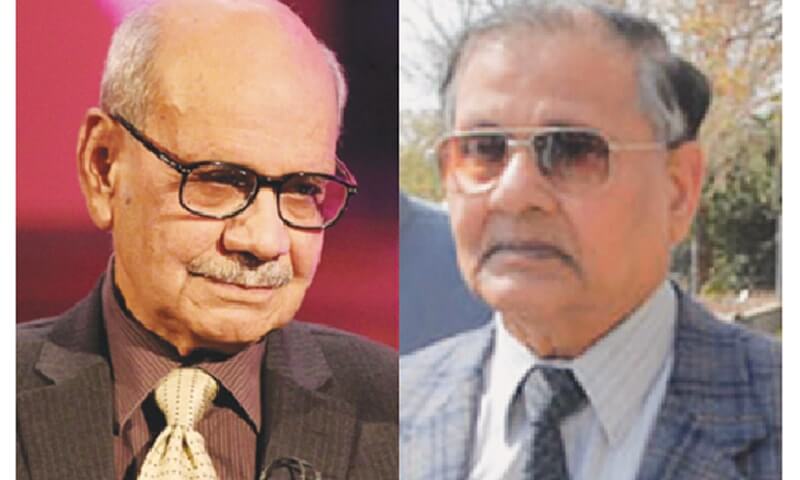
After Zia-ul-Haq’s sudden death in a plane crash, General Mirza Aslam Beg, the new Chief of Army Staff, played a crucial role in Pakistan’s history. A firm supporter of civilian rule under Benazir Bhutto on paper, Beg and the then-ISI chief Lt Gen Asad Durrani facilitated the formation of the Islami Jamhoori Ittehad (IJI) to prevent the Pakistan People’s Party (PPP) from coming to power in the 1988 and 1990 elections.
This behind the scene manipulation came to light years later when Air Marshal (retd.) Asghar Khan filed a petition in the Supreme Court alleging that Beg and Asad Durrani distributed money to politicians to stall the PPP’s victory. General Durrani admitted his role on the orders of the top brass — in an affidavit. Eventually, both Beg and Durrani were declared guilty of subverting the Constitution and the democratic process, but surprisingly, no punishment was awarded to them.
Beg also supported Kashmiri militants to facilitate irregular proxy wars or cross-border terrorism as an instrument of state policy. This strategy seemed clever in the short term, but in the long run backfired on Pakistan – leading to international scrutiny and sanctions.
Mirza Aslam Beg didn’t impose martial law, but his behind the scene manipulations were no less toxic — perhaps even more corrosive than a coup in the long run.
Also Read:
Enemies within: Generals who destroyed Pakistan 1
Enemies within: Generals who destroyed Pakistan 2
Gen Asif Nawaz Janjua – 4th COAS (16 Aug 91 – 8 Jan 93)
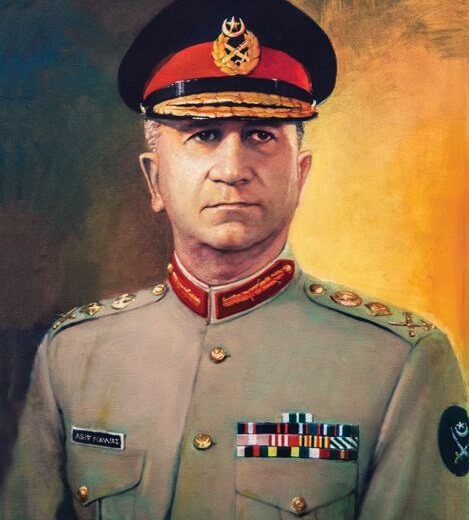
Commissioned into the 5th Punjab Regiment, General Asif Nawaz Janjua had a short but eventful tenure. A sword of honour winner from the Royal Military Academy in Sandhurst, UK, he tried to keep the military away from politics— but this made him unpopular and allegedly led to his untimely death in 1993.
General Janjua was appointed as the 4th Chief of Army Staff by Prime Minister Nawaz Sharif after General Mirza Aslam Beg’s retirement in 1991.
During his tenure as Chief of Army Staff (1991–1993) Gen Janjua refused to be dragged into the conflict between Prime Minister Nawaz Sharif and President Ghulam Ishaq Khan and tried to keep the army apolitical. But in the process made enemies in politics and the military-industrial mafias in Karachi.
Janjua rejected requests to stage a coup and maintained that political matters should be resolved by the politicians themselves.
President Ghulam Ishaq Khan wanted Janjua to pressurise Prime Minister Nawaz Sharif using military backing, but Janjua refused to support such extra-constitutional interference. This infuriated President Ghulam Ishaq Khan and caused a rift between the army leadership and the office of the president.
General Janjua did not support ISI’s political activities, particularly its role in supporting sectarian or ethnic militias and influencing elections by funding organisations like the Islami Jamhoori Ittehad (IJI).
General Janjua did not want the ISI to meddle in internal affairs and wanted it to focus it on external intelligence. His firm stand on professional matters also made him unpopular among the lobbies within the Inter-Services Intelligence (ISI) and Military Intelligence (MI).
Even his decision to curb corruption and deploy the army to crush criminals and militants in Karachi added to his unpopularity and list of enemies.
General Janjua collapsed after a treadmill workout at his residence in Rawalpindi and was pronounced dead on 8 January 1993. His widow, Nuzhat Janjua alleged he had been poisoned. While the forensic examination of his hair and tissue samples at the U.S. Armed Forces Institute of Pathology and other foreign labs confirmed the presence of arsenic, Pakistani authorities officially declared that the cause of his death was natural — due to heart attack.
General Janjua, Admiral Hasan Hafeez Ahmed, General Zia-ul-Haq, and Air Chief Marshal Mushaf Ali Mir were among the few Pakistani military chiefs to die in office.
Also Read: Enemies within: Generals who destroyed Pakistan 1
General Abdul Waheed Kakar the 5th Chief of Army Staff (Jan 1993 – Jan 1996)
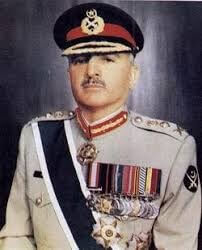
Hailing from the Kakar Pashtun tribe, General Abdul Waheed Kakar, served as the 5th Chief of Army Staff (COAS) during a tumultuous period in Pakistan’s political history.
General Kakar was appointed COAS in January 1993, by President Ghulam Ishaq Khan superseding at least five senior generals, without consulting the prime minister after the sudden death of General Asif Nawaz Janjua.
General Kakar played a pivotal role in the 1993 constitutional crisis by securing the resignation of both President Ghulam Ishaq Khan and Prime Minister Nawaz Sharif.
In 1995, General Kakar uncovered a coup plot orchestrated by Major General Zahirul Islam Abbasi and members of the militant group Harkat-ul-Jihad-al-Islami. The plan aimed to assassinate both General Kakar and Prime Minister Benazir Bhutto and establish an Islamic regime. However the conspiracy was foiled, and the conspirators were arrested.
After completing his three-year term, General Kakar retired in January 1996 and has been leading a quiet life in Rawalpindi, never appearing in public.
General Jehangir Karamat – 6th Chief of Army Staff (Jan 12, 1996, to Oct 6, 1998)
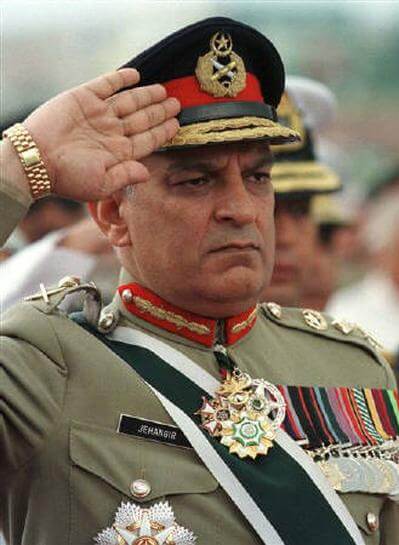
General Jehangir Karamat served as the 6th Chief of Army Staff (COAS) from January 12, 1996, to October 6, 1998, and concurrently held the position of Chairman of the Joint Chiefs of Staff Committee from November 9, 1997, until his resignation in October 1998.
As the Chief of Army Staff, General Karamat supported the decision to conduct nuclear tests in May 1998 but had to resign shortly thereafter due to a difference of opinion with Prime Minister Nawaz Sharif over the establishment of a National Security Council. His proposal was perceived by Prime Minister Nawaz Sharif as an encroachment on civilian authority.
On 6 October 1998, Karamat was forcibly relieved from his four-star command by Prime Minister Nawaz Sharif. He is also one of the very few army generals in the military history of Pakistan to have resigned over a disagreement with the civilian authorities.
Admiral Fasih Bokhari (Chief of Naval Staff at that time) criticised General Karamat for resigning. But, Karamat defended his actions as the “right thing” to do as he lost the confidence of a constitutionally elected Prime Minister.
General Pervez Musharraf vs. Nawaz Sharif – A Clash That Reshaped Pakistan
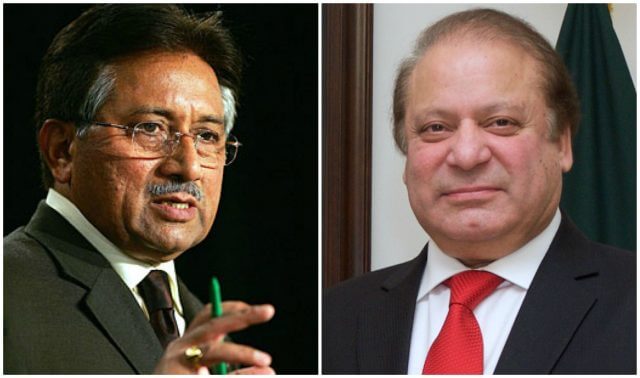
In 1998, Nawaz Sharif appointed Pervez Musharraf as Chief of Army Staff, superseding more senior generals due to the belief that Musharraf would prove to be a submissive military chief. But within a year, Musharraf and his corps commanders organised the Kargil conflict without political approval. As a result, Nawaz Sharif had to seek U.S. mediation to prevent a full-blown war with India. This led to a rift between the military and the civilian government and one of the most dramatic power struggles in Pakistan’s history.
Sharif tried to dismiss Musharraf while he was in mid-air returning from Sri Lanka on 12 October 1999. In retaliation, Musharraf ordered his Corps commanders to defy the Prime Minister’s orders and take control of the state institutions. In this manner, General Musharraf overthrew the government of Prime Minister Nawaz Sharif in a bloodless coup and went on to rule Pakistan from 1999 to 2008, first as Chief Executive and then as President. Nawaz Sharif was sentenced to life imprisonment but was later sent into exile to Saudi Arabia in 2000.
Also Read: Enemies within: Generals who destroyed Pakistan 2
The turning point of Musharraf’s rule came after the 9/11 attacks in 2001 when, under intense U.S. pressure, he was forced to stop supporting the Taliban and align Pakistan with the US War on Terror. This shift brought billions in military and economic aid to Pakistan and made Musharraf a central figure in global counter-terrorism. But it also pushed Pakistan into a complex internal war, especially in the tribal areas.
He almost burnt his fingers when he banned extremist groups, curbed madrassa funding and enabled American drone strikes to appease the West while sheltering Taliban commanders and allowing militancy to fester. Groups like the Taliban and Lashkar-e-Taiba operated with freedom.
In 2007, he dismissed Chief Justice Iftikhar Chaudhry and declared a state of emergency to preserve his dual role as president and army chief. Probably the last nail in his proverbial coffin was the failure to prevent the assassination of former Prime Minister Benazir Bhutto. This led to a serious backlash, and his credibility was rapidly eroded.
Finally, Musharraf had to resign and went into self-imposed exile to avoid impeachment in August 2008, due to mounting political pressure, judicial activism, and declining popularity. General Musharraf died in February 2023 in Dubai, after a prolonged illness.
After Musharraf’s fall, it seemed like Pakistan would finally return to civilian rule. But what followed was “hybrid democracy” – a more sophisticated version of control. Civilian governments were allowed, but only under the watchful eye of the army.

